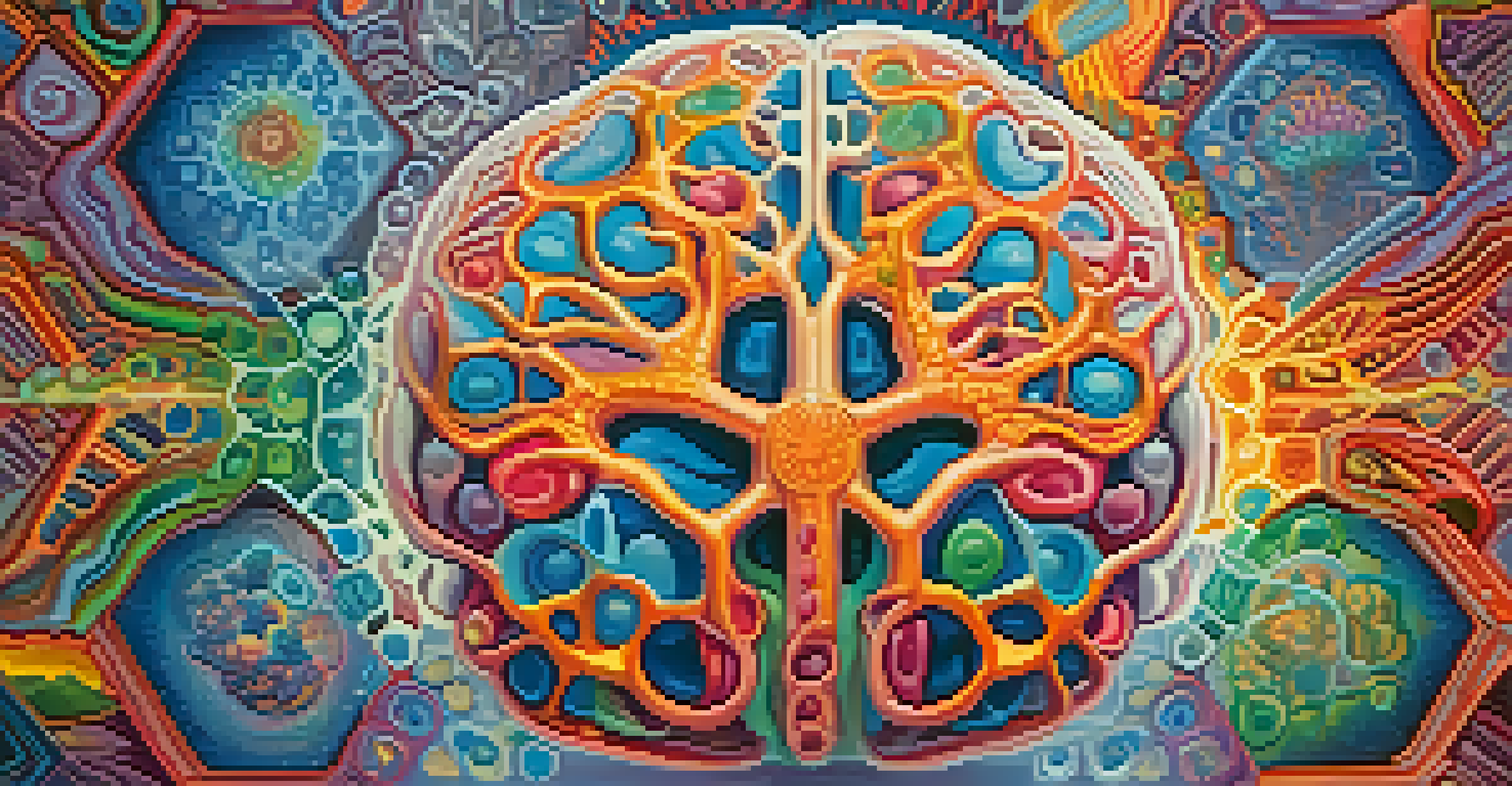Psychedelics and Mental Health: Implications for Consciousness

Understanding Psychedelics: A Brief Overview
Psychedelics are substances that alter perception, mood, and cognitive processes. Common examples include LSD, psilocybin (found in magic mushrooms), and DMT. Historically, these substances have been used in various cultures for spiritual and healing purposes.
Psychedelics can help people confront their trauma and gain insights that lead to healing.
In recent years, the scientific community has reignited interest in psychedelics, particularly their potential benefits for mental health. This resurgence is driven by promising research showing their effectiveness in treating conditions like depression, anxiety, and PTSD.
As we explore the connection between psychedelics and mental health, it’s essential to understand both the potential benefits and the risks. Psychedelics can lead to profound experiences, but they also require careful consideration and respect for their power.
The Science Behind Psychedelics and Brain Function
Psychedelics primarily affect serotonin receptors in the brain, leading to altered mood and perception. This interaction can promote neuroplasticity, allowing the brain to form new connections and pathways. Essentially, psychedelics can 'reset' the brain, offering new perspectives on entrenched mental health issues.

Studies have shown that psychedelics can help individuals process trauma and confront deep-seated emotions. For example, patients with PTSD often report significant reductions in symptoms after guided psychedelic therapy sessions.
Psychedelics Aid Mental Health
Research shows psychedelics can effectively treat conditions like depression, anxiety, and PTSD.
Additionally, psychedelics may enhance creativity and problem-solving abilities. This can be particularly beneficial for individuals stuck in rigid thought patterns, helping them see their challenges in a new light.
Psychedelics and Their Role in Treating Depression
Depression is a pervasive mental health condition that affects millions globally. Traditional treatments, such as SSRIs, don't work for everyone, prompting researchers to explore alternative therapies, including psychedelics.
The experience of psychedelics can lead to profound acceptance and peace, especially in the face of existential fears.
Clinical trials have shown that substances like psilocybin can lead to significant reductions in depressive symptoms, often after just a few sessions. Participants frequently describe feelings of connection, openness, and a greater sense of purpose.
This shift in perspective can be transformative, allowing individuals to break free from the cycle of negative thinking that often accompanies depression. As more research unfolds, psychedelics may become a mainstream option for those seeking relief.
Exploring the Potential for Treating Anxiety Disorders
Anxiety disorders can be debilitating, impacting daily life and overall well-being. Traditional therapies often include cognitive-behavioral therapy (CBT) and medication, but psychedelics are emerging as a potential adjunct treatment.
Preliminary studies indicate that psychedelics can reduce anxiety symptoms, particularly in patients facing terminal illness. In these cases, the experience of confronting existential fears can lead to profound acceptance and peace.
Importance of Set and Setting
The mindset and environment during psychedelic experiences significantly influence their therapeutic outcomes.
Moreover, the introspective journeys facilitated by psychedelics help individuals gain insights into the root causes of their anxiety. This can pave the way for long-term healing and improved mental resilience.
Psychedelics in the Context of PTSD Treatment
Post-Traumatic Stress Disorder (PTSD) affects many individuals, particularly veterans and survivors of trauma. Traditional treatments can be insufficient, leading to a search for more effective solutions, such as psychedelics.
Research suggests that psychedelics can help patients reprocess traumatic memories in a safe and supportive environment. By confronting these memories with a new perspective, individuals can begin to heal and move forward.
The therapeutic setting is crucial; guided sessions with trained professionals can enhance the effectiveness of psychedelic therapy. This combination of support and substance paves the way for meaningful recovery.
The Role of Set and Setting in Psychedelic Experiences
The concept of 'set and setting' refers to the mindset of the individual and the environment in which they consume psychedelics. Both factors significantly influence the experience and its outcomes.
A positive, supportive atmosphere can lead to profound insights and healing, while a chaotic or unsafe environment may trigger anxiety or confusion. Thus, creating a safe space is paramount for maximizing the benefits of psychedelics.
Future of Psychedelics in Therapy
Ongoing studies suggest psychedelics may complement traditional mental health treatments, offering new hope for patients.
Therapeutic sessions often involve preparation and integration discussions, helping participants navigate their experiences. This holistic approach ensures that the insights gained are meaningful and applicable to their lives.
Future Directions: The Integration of Psychedelics in Mental Health Care
As research continues to unveil the benefits of psychedelics, their integration into mental health care is becoming more plausible. Leading institutions are conducting clinical trials to establish protocols and safety guidelines for their use.
The potential for psychedelics to complement traditional therapies is exciting. They may offer alternatives for those who have found little relief in conventional treatments, providing hope for many.

However, it’s essential to approach this integration thoughtfully, ensuring that education, safety, and ethical considerations are prioritized. By doing so, we can unlock the full potential of psychedelics in mental health treatment.